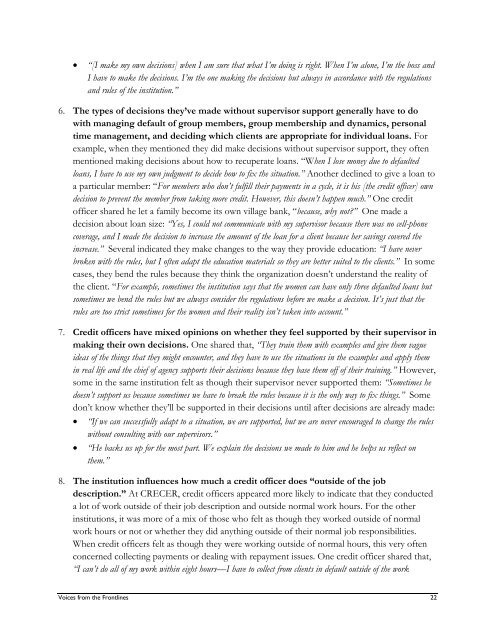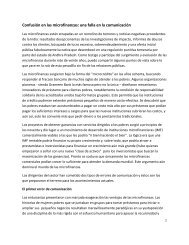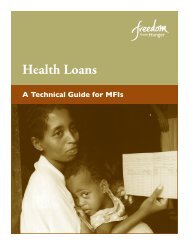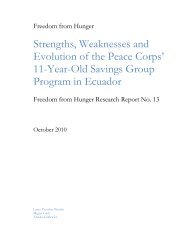Voices from the Frontlines: - Freedom from Hunger
Voices from the Frontlines: - Freedom from Hunger
Voices from the Frontlines: - Freedom from Hunger
You also want an ePaper? Increase the reach of your titles
YUMPU automatically turns print PDFs into web optimized ePapers that Google loves.
“[I make my own decisions] when I am sure that what I’m doing is right. When I’m alone, I’m <strong>the</strong> boss and<br />
I have to make <strong>the</strong> decisions. I’m <strong>the</strong> one making <strong>the</strong> decisions but always in accordance with <strong>the</strong> regulations<br />
and rules of <strong>the</strong> institution.”<br />
6. The types of decisions <strong>the</strong>y’ve made without supervisor support generally have to do<br />
with managing default of group members, group membership and dynamics, personal<br />
time management, and deciding which clients are appropriate for individual loans. For<br />
example, when <strong>the</strong>y mentioned <strong>the</strong>y did make decisions without supervisor support, <strong>the</strong>y often<br />
mentioned making decisions about how to recuperate loans. “When I lose money due to defaulted<br />
loans, I have to use my own judgment to decide how to fix <strong>the</strong> situation.” Ano<strong>the</strong>r declined to give a loan to<br />
a particular member: “For members who don’t fulfill <strong>the</strong>ir payments in a cycle, it is his [<strong>the</strong> credit officer] own<br />
decision to prevent <strong>the</strong> member <strong>from</strong> taking more credit. However, this doesn’t happen much.” One credit<br />
officer shared he let a family become its own village bank, “because, why not?” One made a<br />
decision about loan size: “Yes, I could not communicate with my supervisor because <strong>the</strong>re was no cell-phone<br />
coverage, and I made <strong>the</strong> decision to increase <strong>the</strong> amount of <strong>the</strong> loan for a client because her savings covered <strong>the</strong><br />
increase.” Several indicated <strong>the</strong>y make changes to <strong>the</strong> way <strong>the</strong>y provide education: “I have never<br />
broken with <strong>the</strong> rules, but I often adapt <strong>the</strong> education materials so <strong>the</strong>y are better suited to <strong>the</strong> clients.” In some<br />
cases, <strong>the</strong>y bend <strong>the</strong> rules because <strong>the</strong>y think <strong>the</strong> organization doesn’t understand <strong>the</strong> reality of<br />
<strong>the</strong> client. “For example, sometimes <strong>the</strong> institution says that <strong>the</strong> women can have only three defaulted loans but<br />
sometimes we bend <strong>the</strong> rules but we always consider <strong>the</strong> regulations before we make a decision. It’s just that <strong>the</strong><br />
rules are too strict sometimes for <strong>the</strong> women and <strong>the</strong>ir reality isn’t taken into account.”<br />
7. Credit officers have mixed opinions on whe<strong>the</strong>r <strong>the</strong>y feel supported by <strong>the</strong>ir supervisor in<br />
making <strong>the</strong>ir own decisions. One shared that, “They train <strong>the</strong>m with examples and give <strong>the</strong>m vague<br />
ideas of <strong>the</strong> things that <strong>the</strong>y might encounter, and <strong>the</strong>y have to use <strong>the</strong> situations in <strong>the</strong> examples and apply <strong>the</strong>m<br />
in real life and <strong>the</strong> chief of agency supports <strong>the</strong>ir decisions because <strong>the</strong>y base <strong>the</strong>m off of <strong>the</strong>ir training.” However,<br />
some in <strong>the</strong> same institution felt as though <strong>the</strong>ir supervisor never supported <strong>the</strong>m: “Sometimes he<br />
doesn’t support us because sometimes we have to break <strong>the</strong> rules because it is <strong>the</strong> only way to fix things.” Some<br />
don’t know whe<strong>the</strong>r <strong>the</strong>y’ll be supported in <strong>the</strong>ir decisions until after decisions are already made:<br />
“If we can successfully adapt to a situation, we are supported, but we are never encouraged to change <strong>the</strong> rules<br />
without consulting with our supervisors.”<br />
“He backs us up for <strong>the</strong> most part. We explain <strong>the</strong> decisions we made to him and he helps us reflect on<br />
<strong>the</strong>m.”<br />
8. The institution influences how much a credit officer does “outside of <strong>the</strong> job<br />
description.” At CRECER, credit officers appeared more likely to indicate that <strong>the</strong>y conducted<br />
a lot of work outside of <strong>the</strong>ir job description and outside normal work hours. For <strong>the</strong> o<strong>the</strong>r<br />
institutions, it was more of a mix of those who felt as though <strong>the</strong>y worked outside of normal<br />
work hours or not or whe<strong>the</strong>r <strong>the</strong>y did anything outside of <strong>the</strong>ir normal job responsibilities.<br />
When credit officers felt as though <strong>the</strong>y were working outside of normal hours, this very often<br />
concerned collecting payments or dealing with repayment issues. One credit officer shared that,<br />
“I can’t do all of my work within eight hours—I have to collect <strong>from</strong> clients in default outside of <strong>the</strong> work<br />
<strong>Voices</strong> <strong>from</strong> <strong>the</strong> <strong>Frontlines</strong> 22















